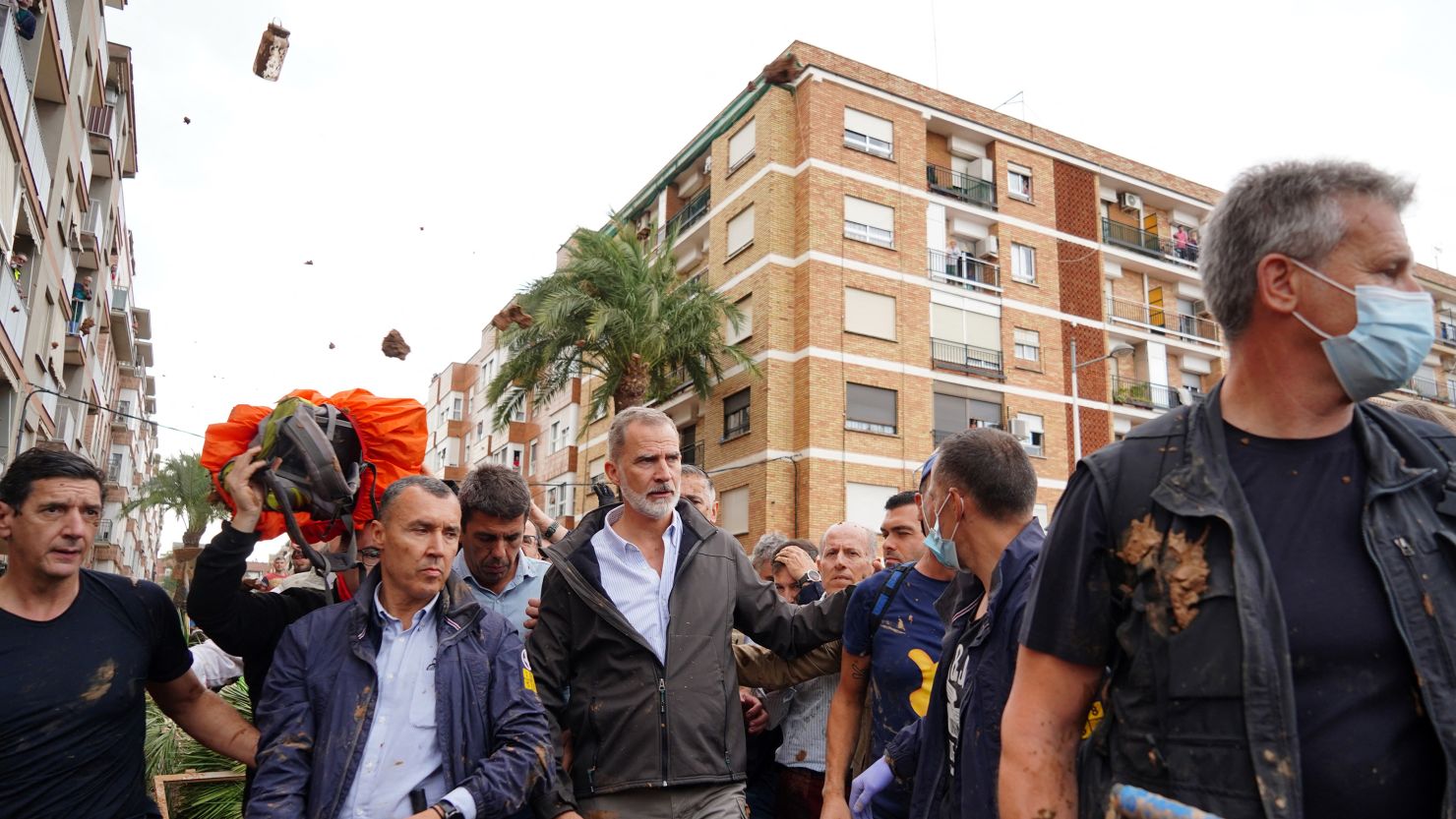Angry residents booed and threw eggs at Spain’s King Felipe and Queen Letizia as they visited the Valencia region, where more than 200 people have died in devastating floods.
The king faced chants of “murderer” as he visited hard-hit Paiporta, just outside of Valencia city, along with Prime Minister Pedro Sanchez and regional governor Carlos Mazon, where locals accuse authorities of a lax response to the disaster.
After they posed for a photo, the crowd began hurling insults at the king, Mazon and Sanchez. The crowd surged forwards as security opened umbrellas to try and protect them from projectiles.
Confronted by one resident, Felipe remained calm and lowered his umbrella to listen to him as police struggled to control those gathered. Queen Letizia also also spoke with furious residents and seemed visibly shaken, holding her head in her hands.
The Royal Family’s social media channel released video in the aftermath of the protest, showing the king and queen embracing distraught residents. One man fell weeping into the king’s arms and in another shot, the King is seen hugging two crying women.
It is unusual for a Spanish king to face such fierce anger up close. Felipe is a relatively popular figure, who ascended the throne after the abdication of his father.
The anger appeared largely directed at Mazon and Sanchez, who left early even as the king insisted on staying on despite the chaos.
Sanchez’s office in a statement said that the prime minister had been taken away, following security protocol. In a statement on X, Mazon said he understood the anger and praised the “exemplary” conduct of the king.
At least 214 people are now confirmed dead from the floods and the toll may climb higher. Among the latest victims was a 70-year-old woman whose body was found more than 12 kilometers (seven miles) from her house

The slow and uncoordinated response to the crisis has infuriated many in Valencia. Text alerts came hours after warnings of flooding from the weather service.
On Saturday, Sanchez ordered 5,000 more troops to help with salvage efforts in flooded areas, calling the storm the “worst natural disaster” in the county’s history.
He addressed the anger and frustration at the slow response by authorities, admitting it was “not enough”.
Part of the problem has been political. Mazon and Sanchez are from different parties, and under Spain’s political system, Spain’s federal government cannot release emergency funds and resources without the authorization from a regional government. That didn’t happen until Saturday, four days after the floods hit.
On Sunday, authorities called on residents to take shelter as the Spanish Weather Agency increased its weather alert in the coastal Valencia area to the maximum red level due to more expected rain.
By Monday, the red rainfall warnings expired for Valencia, according to Spain’s meteorology department, AEMET, though orange and yellow rainfall and storm warnings were in effect for parts of Castellón and Tarragona.
Social media videos posted by locals show police vehicles going through the streets of Aldaia in eastern Spain telling residents through a megaphone to go home and avoid the areas next to the local ravine.
In photos: Flash flooding devastates parts of Spain
Aldaia mayor Guillermo Lujan also urged residents to leave their places of work, posting to X telling them to get out of the streets due to the latest alert. Further south, the Murcia regional government sent out an SMS alert telling Mazarrón residents to avoid certain areas as water levels are rising due to rains.
Thousands of volunteers meanwhile have answered the provincial government’s call for help to clear flood debris. Authorities seemed unprepared and overwhelmed, quickly running out of supplies and scrambling to find more buses to transport people.
Volunteers waited hours only to be turned away, frustrating many. Pedro de Juan, 18, had only seen scenes like this in the movies but he showed up before 7 a.m. to board the volunteer buses. He voiced the frustration many are feeling.
“It’s amazing how the government says yeah, it’s not our fault. It’s someone else’s fault. But at this time we have to put our hands together and help each other,” he told CNN on Saturday while waiting in line.
“The military and police are helping but not as much as we hoped and they are days late.”
Mia Alberti and Michael Rios contributed to this report.





























































